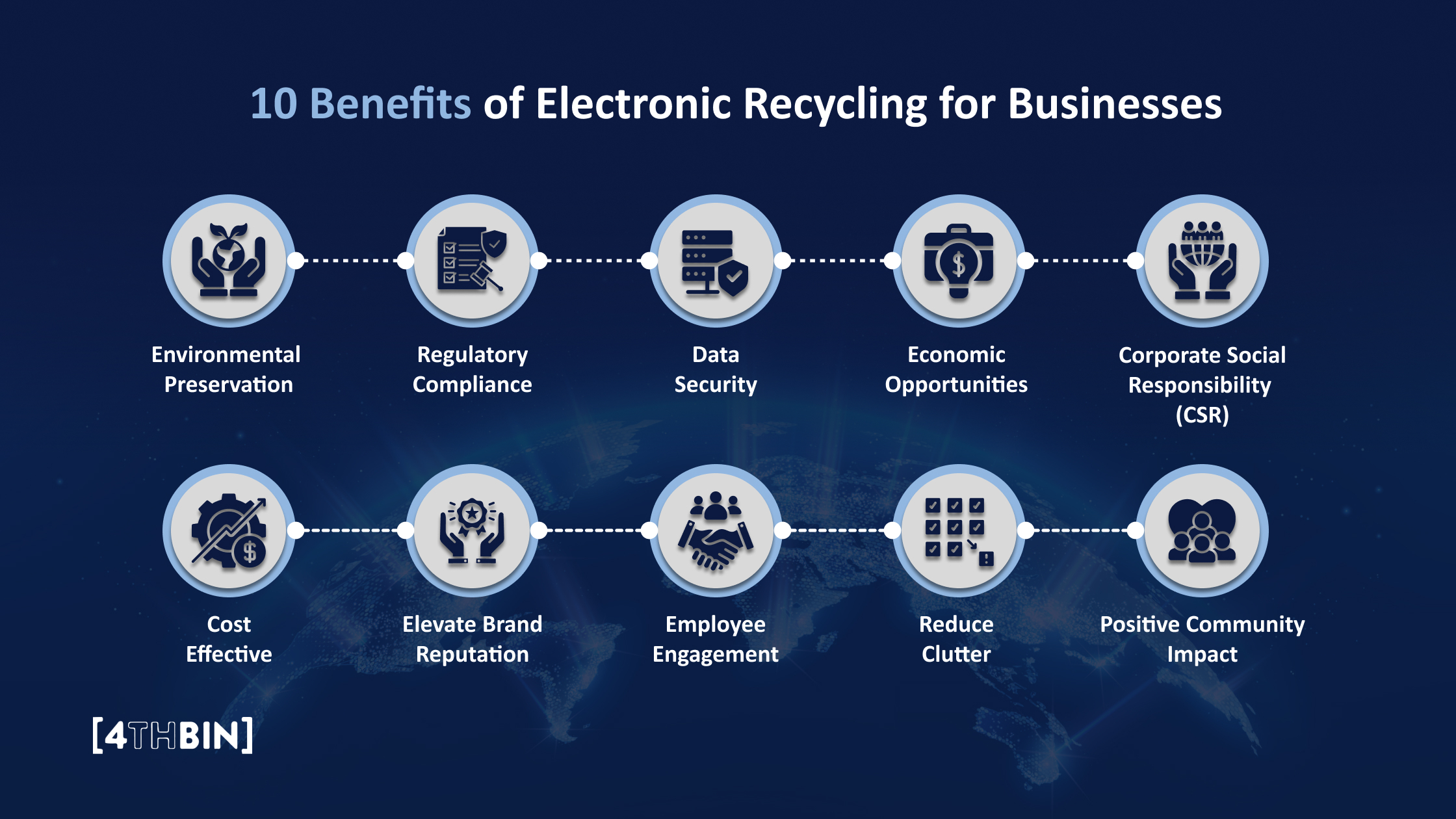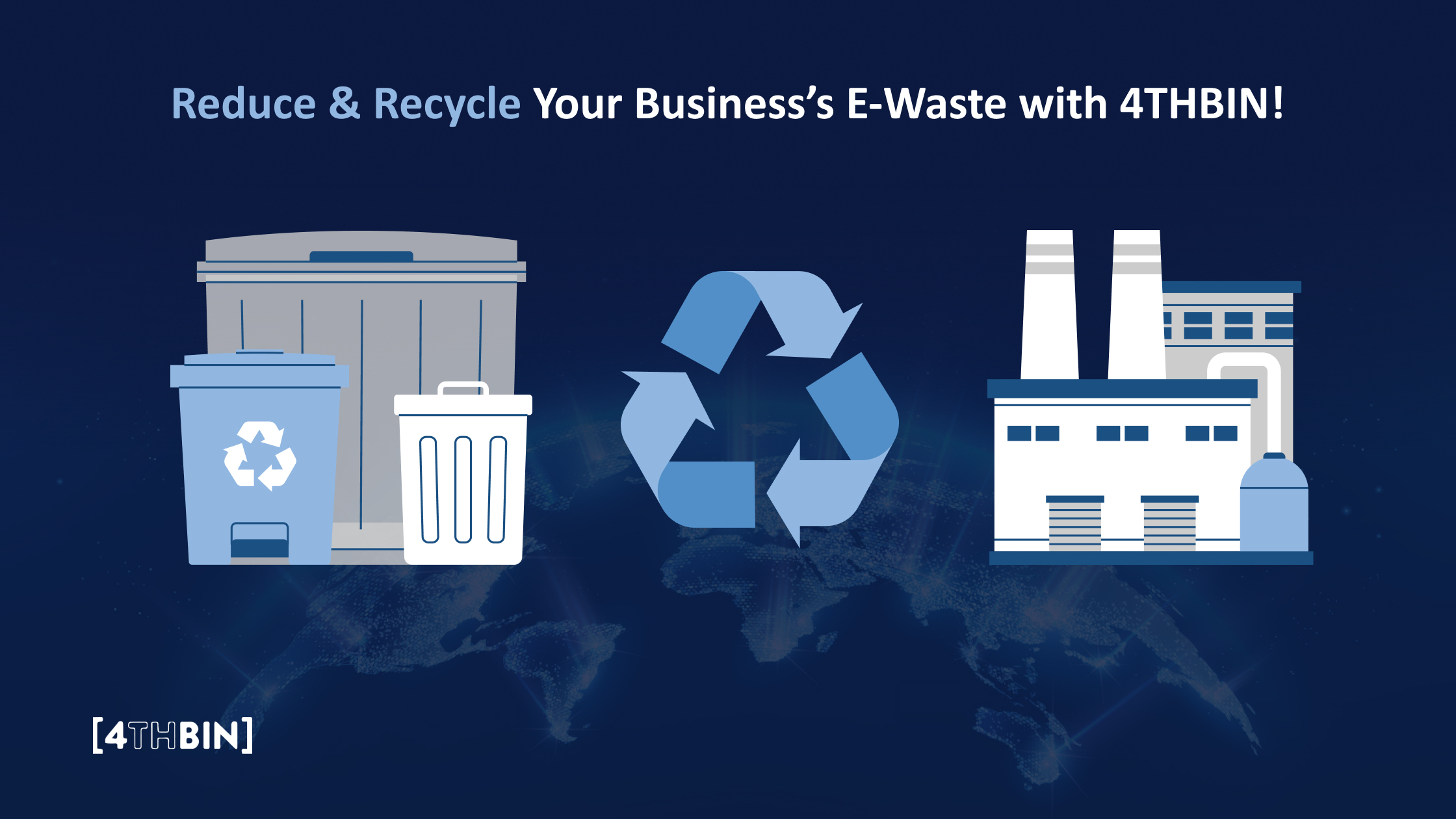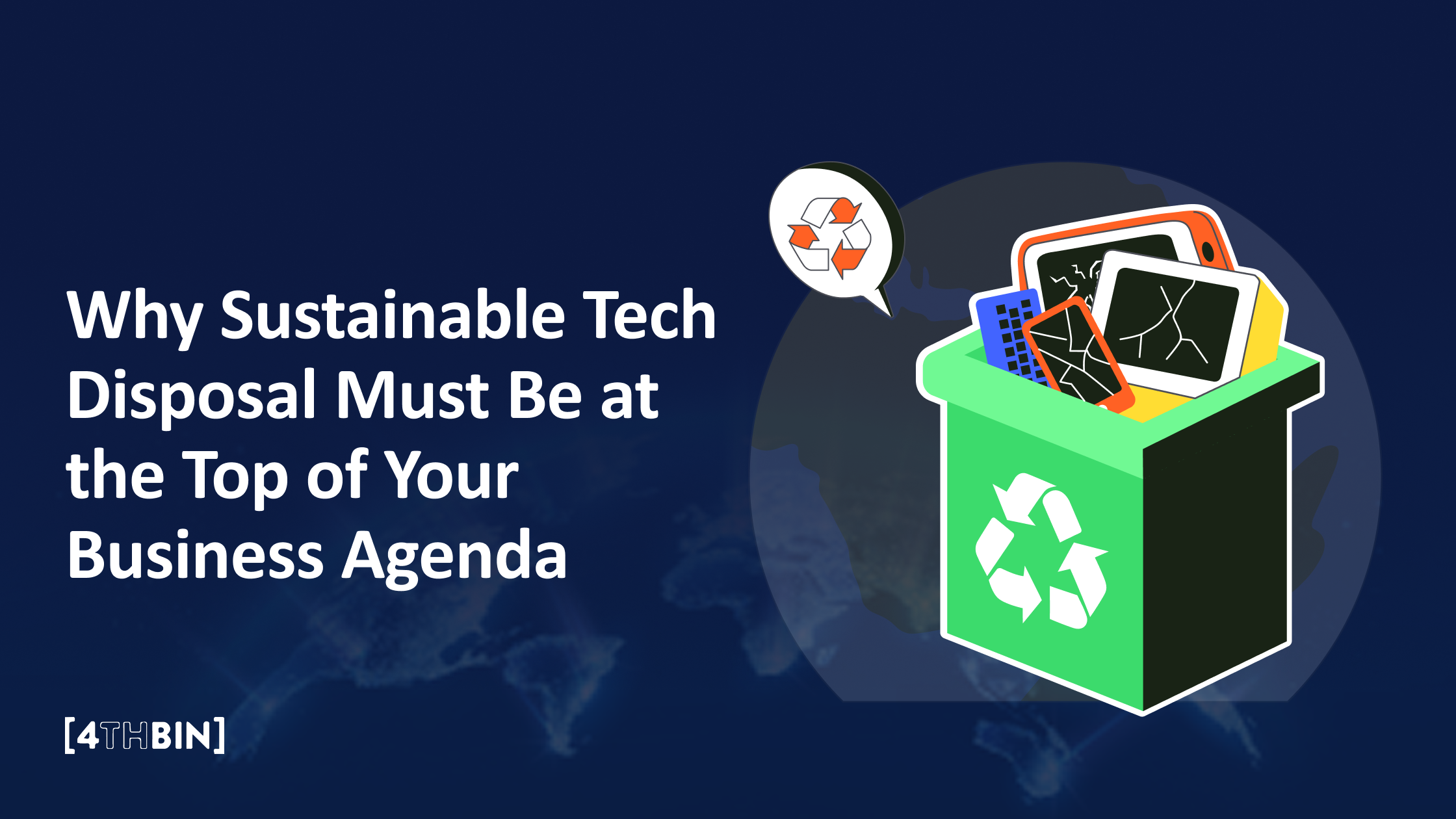Top 10 Benefits of Electronics Recycling for Businesses
Did you know we generate about 50 million tonnes of e-waste annually? This is equivalent to throwing out 1000 laptops every single second!
A record 62 million tonnes of e-waste were produced in 2022. However, less than a quarter of that year’s e-waste mass was documented as properly collected and recycled. As a consequence, the rest was dumped into landfills or incinerators, where it was burned, releasing harmful toxins into the air.
The annual generation of e-waste is rising by 2.6 million tonnes and is on track to reach 82 million tonnes by 2030, a further 33% increase from 2022. With such alarming figures, electronics recycling must be a priority for all businesses.
This article will explore ten benefits of electronics recycling for businesses. Let’s dive right into it.
10 Benefits of Electronics Recycling for Businesses

Electronics recycling is a responsible environmental practice and a strategic business move. Here are the top ten benefits of electronics recycling for businesses:
1. Environmental Preservation
2. Regulatory Compliance
3. Data Security
4. Economic Opportunities
5. Corporate Social Responsibility
6. Cost Effectiveness
7. Elevate Brand Reputation
8. Employee Engagement
9. Reduce Clutter
10. Positive Community Impact
Let us explore the benefits of secure electronic recycling for businesses in detail.
1. Environmental Preservation
The most crucial benefit of electronic recycling for businesses is preserving the environment. Electronic waste contains harmful substances such as lead, mercury, and cadmium, which can pollute the air and water if not disposed of properly.
According to the U.S. Environmental Protection Agency, 85 percent of electronics are now thrown out rather than recycled. In New York City, the New York Department of Sanitation collects 25,000 tonnes of electronic waste annually, which is either disposed of in landfills or burned in the Newark Incinerator, discharging toxic pollutants into the air. These toxins can penetrate groundwater and enter the food chain when dumped into landfills.
Exposure to humans can result in severe consequences from these substances, including congenital disabilities and harm to vital organs like the brain, heart, liver, kidneys, skeletal system, and reproductive system. Recycling these toxins ensures safe management, which not only reduces the company’s carbon footprint but also promotes sustainability. Such environmental commitment can enhance the company’s reputation as an eco-friendly organization.
2. Regulatory Compliance
Numerous regions enforce stringent regulations on e-waste disposal. For instance, New York's Electronic Equipment Recycling and Reuse Act (EERRA) mandates businesses to responsibly manage their e-waste. These laws hold every business accountable for secure e-waste handling and proper recycling practices. Non-compliance can result in substantial fines and legal consequences. By adopting proper e-waste management and recycling measures, companies can adhere to local, state, and federal regulations, mitigate legal risks, and showcase their dedication to environmental compliance.
3. Data Security
In 2023, there were 3,205 reported data breaches affecting 353,027,892 individuals, marking a 78% surge from 2022, according to the Identity Theft Resource Centre. These statistics underscore the critical importance of secure data destruction. Over time, businesses have accumulated substantial volumes of sensitive data on outdated electronic devices.
Improper handling of electronic devices by businesses can result in data breaches, compromising sensitive company information. Certified electronic recycling providers, such as 4THBIN, ensure thorough data destruction using secure methods like data wiping and physical destruction.
4. Economic Opportunities
For every 1 million cell phones recycled, 35,274 pounds of copper, 772 pounds of silver, 75 pounds of gold, and 33 pounds of palladium can be recovered. This highlights how electronic recycling can help businesses generate materials they can reuse, creating a circular economy setup. A recent study in Minnesota found that if businesses correctly recycled a year’s worth of electronic waste, it would lead to:
- Recovery of 78 million pounds of valuable materials
- Creation of over 3,000 jobs
- Sufficient silver to manufacture 440,000 solar panels
- Adequate copper for 155,000 electric vehicles
The study results highlight the most significant benefit of electronic recycling – generating massive economic benefits and opportunities and creating a circular economy that recycles, reuses, repairs, and refurbishes products and materials.
5. Corporate Social Responsibility (CSR)
84% of customers say poor environmental practices will alienate them from a brand or company.
Customers today are more informed and selective about the brands they support. They tend to favor companies that align with their values, particularly those that are environmentally conscious. By integrating electronic recycling into their corporate social responsibility (CSR) initiatives, companies can strengthen brand loyalty and foster trust among customers. Promoting these initiatives across multiple platforms can raise awareness about the company’s dedication to its ethical responsibilities, such as reducing its environmental impact.
Moreover, an effective CSR strategy can enhance a business's appeal to investors. In today's landscape, investors prioritize environmental, social, and governance (ESG) criteria when evaluating where to allocate capital. Companies that emphasize sustainability and ethical practices are often viewed as lower-risk investments. By showcasing a robust electronics recycling program within their CSR framework, businesses can significantly enhance their attractiveness to ESG-focused investors, potentially leading to increased investment and shareholder value.
6. Cost Effectiveness
Electronic recycling allows businesses to recover valuable materials such as gold, silver, copper, and rare earth elements from old devices. These materials can be reused to produce new electronics, reducing the need to purchase expensive raw materials and leading to substantial cost savings.
Furthermore, electronic recycling plays a role in conserving energy. For instance, recycling 1 million laptops can save energy equivalent to that used by 3,500 U.S. homes annually. Businesses that utilize recycled materials in manufacturing typically require less energy compared to using fresh raw materials. This integration of recycled materials into production processes not only reduces energy consumption but also supports the company's sustainability objectives, leading to overall cost savings.
7. Elevate Brand Reputation
55% of consumers are willing to pay more for eco-friendly brands. Engaging in electronic recycling can significantly elevate a company’s brand reputation. As consumers and stakeholders become increasingly eco-conscious, businesses prioritizing sustainable, ethical, and secure practices are viewed more favorably. By actively recycling electronics, companies demonstrate a commitment to environmental causes, which can enhance their public image and differentiate them from competitors.
This positive perception can lead to increased brand loyalty and customer trust. Moreover, consumers are more likely to support brands that align with their values, particularly those committed to sustainability. By highlighting their recycling efforts, businesses can attract eco-conscious customers who value environmental responsibility, cultivating long-term loyalty and advocacy.
8. Employee Engagement
In a State of the Consumer survey, 69% of employees said they want their companies to invest in sustainability efforts, including reducing carbon, using renewable energy, and reducing waste. Businesses can significantly boost employee engagement and morale by implementing electronics recycling programs, which nurture a sense of purpose.
Another survey revealed that companies where employees felt a genuine commitment to sustainability had a 16% higher employee engagement rate than those where employees felt the commitment was absent. When employees see their company taking meaningful steps toward sustainability, it reinforces the idea that their work contributes to the greater good. This sense of purpose can increase job satisfaction and motivate employees to be more committed and productive.
9. Reduce Clutter
Accumulated e-waste can pose safety hazards in the workplace. Stacks of unused electronics can block walkways, create tripping hazards, and increase the risk of accidents. By systematically recycling these items, businesses can maintain a safer work environment, reducing the likelihood of workplace injuries and the associated costs. Besides, a clutter-free space contributes to overall employee well-being and can lead to a more harmonious and productive workplace!
Moreover, businesses can streamline asset management by tracking equipment throughout its lifecycle. Businesses can maintain an inventory of their electronic assets, making it easier to identify which items are still in use, which need upgrading, and which can be recycled. This proactive approach to asset management ensures that resources are used efficiently and can prevent the unnecessary purchase of new equipment, leading to significant savings.
10. Positive Community Impact
When businesses actively engage in electronic recycling, they set a positive example for other organizations and individuals in the community. This leadership can inspire others to adopt similar ethical, environmentally responsible practices, leading to broader community participation in sustainability efforts. The ripple effect of one organization’s commitment can significantly amplify the positive impact on the environment.
Moreover, the proper disposal and secure recycling of e-waste prevent harmful substances from contaminating the air, water, and soil within community spaces. This contributes to a healthier environment, which benefits everyone living and working in the area. Fresh air, water, soil, and reduced pollution can improve the overall quality of life and promote community well-being.
While electronics recycling has numerous benefits for businesses, taking up the recycling initiative can be overwhelming amidst other critical initiatives. Partnering with a company that offers secure electronics recycling services will aid your business in streamlining its e-waste management, safely deleting organizational data, and being compliant!
Reduce & Recycle Your Business’s E-Waste with 4THBIN!

Is your organization struggling to recycle its electronic waste? 4THBIN to the rescue! With over a decade of experience, 4THBIN is a certified and secure e-recycling solution provider to over 10,000 businesses – from Fortune 100 companies to start-ups across the United States.
We believe that no data should be left behind! Backed by our data security expertise, we provide certified data destruction support to today’s top industries. We also help them deliver on their corporate social responsibility commitments by ensuring their e-waste is securely and sustainably recycled.
Recycle Your Organizational E-Waste Today!










